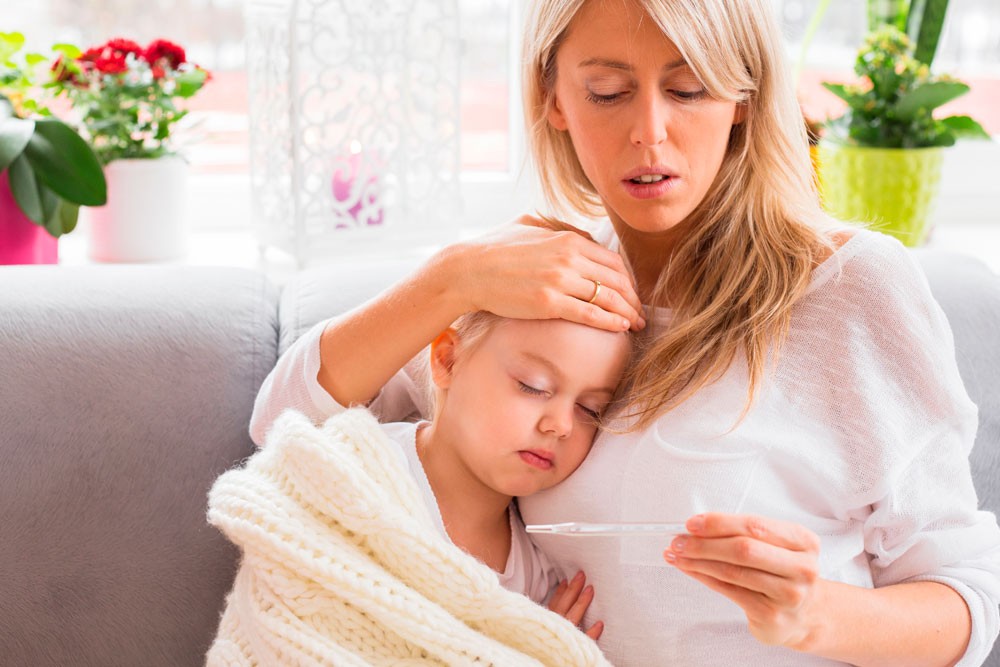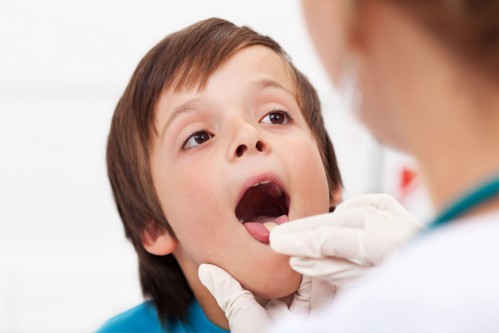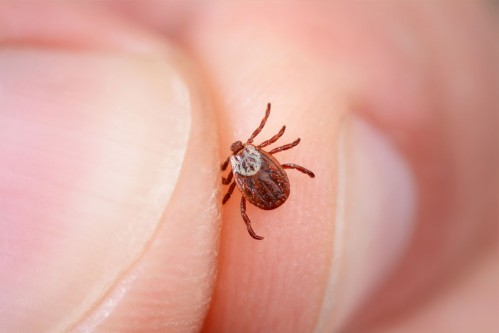
Fever FAQ
Author: Nicole Marty, MD
Most of the time, fever is not a medical emergency and can wait until the next morning to be seen in our office. We know that having a child with a fever can be a scary experience. Read below to find out when to worry and when to relax!
My child has a fever, what do I do now?
The number one thing that we want parents to remember is the child’s symptoms are more important than what the number on the thermometer says. A child may have a temp of 104 but is drinking fluids and doing well. On the other hand, a child may have a temp of 101 but seem lethargic and dehydrated, this child is much more ill. This is why we ask you to pay attention to the symptoms rather than the number. Remember that fever is your child’s body’s way of fighting off infection, and it is a normal response.
What temperature is considered a fever?
A fever is a reading of 100.4 fahrenheit or greater. You do NOT need to add or subtract a degree when taking temp via any method (rectal, oral or tympanic). Simply take the temperature and tell your provider the number as well as the method used to take the temperature.
My child’s temperature has been between 98.7 and 100, does this mean my child has a “low grade” temperature?
No, a temperature under 100F is a normal variation of your child’s body temperature and is not a fever. Body temperature usually peaks in the afternoon to evening.
Is fever dangerous? Can it damage my child’s brain?
No, a fever is actually good because it helps the body kill off bacteria and viruses. Only body temperatures above 108 fahrenheit can cause brain damage and this level of body temperature can only be reached in by extreme environmental temperatures (for example, if a child is left in a hot car).
How do I take my child’s temperature?
The following types of thermometers are available:
- Digital Multi Use: If your child is under the age of 3, the most accurate way to take their temperature is rectally (in the bottom). Over the age of 3, take their tempature orally. Armpit is not recommended.
- How to take a rectal temperature: Clean thermometer with cool water and lubricate the end with petroleum jelly. Insert the thermometer ½ to 1 inch into the anal opening, do not push past resistance. Hold the thermometer there until you hear a “beep” then remove and read the number.
- How to take an oral temperature: Clean thermometer with cool water. Make sure to wait at least 20 minutes after drinking hot or cold liquids before taking temperature. Place in child’s mouth, under the tongue towards the back of the mouth. Wait until you hear the “beep” then remove and read the number.
- Temporal Artery: If your child is 3 months and older, slide the thermmometer across the forehead. New research shows that temporal thermometers are as accurate as rectal.
- Tympanic (Ear): This method is NOT recommended, as many factors can give you a false reading (ear wax, narrow ear canals).
When can I wait until morning to call the office when my child has a fever?
You can generally wait until morning to call the office in the following instances:
- Temperature is less than 100.4
- Child has a temperature of greater than 100.4 but is otherwise doing well (not acting lethargic or showing signs or symptoms of dehydration). Your child may be more tired than usual, but this is normal.
- Child has a temperature, but has received immunizations (shots) in the past two days. This is your child’s immune system doing what it should!
- Fever lasting longer than 24 hours in a child 3 months or older
- Fever lasting longer than 72 hours in a child 6 months or older
- Burning or pain occurs with urination or you suspect that your child has an ear infection
The following signs are generally reassuring that the illness is not serious:
- Child wants to play
- Child is alert and smiling at you
- Drinking fluids well (it is normal not to be hungry with a fever)
- Is comfortable after fever reducing medication is given
- Normal skin color
What should I call about right now?
You should call our after hours number (or office during regular business hours) in the following instances:
- An infant younger than 3 months of age has a fever greater than 100.4F - this is a medical emergency.
- You child’s fever is greater than 104 and is NOT coming down with Tylenol or Ibuprofen. It may not go all the way down to normal, but it should drop at least 1 degree after medication.
- You child is acting odd or lethargic (being tired is normal, but being difficult to arouse is not).
- Your child is showing signs or symptoms of dehydration (dry/cracked lips and a dry mouth, no urine for 8-12 hours, sunken eyes or soft spot on baby’s head, lethargic).
- Your child has a fever, rash and stiff neck.
- Your child appears very ill even after giving fever reducing medication.
- If you are concerned about your child, you should give us a call.
I gave Tylenol or Ibuprofen and my child’s temp did not come down to normal, is this ok?
Yes, if your child has a high fever, Tylenol or ibuprofen will most likely not bring it back down to a normal temperature. Remember, Tylenol or ibuprofen will bring the temp down by 1-2 degrees. In other words, a temperature of 103 will not come down to “normal” after one dose of medication.
If I give Tylenol or ibuprofen and it doesn’t “break” the fever, or bring it down, does that mean that the illness is serious?
Not necessarily. Fevers that don’t come down can be caused by viruses or bacteria. Remember, look at your child’s symptoms (is he or she comfortable after medication) rather than the number on the thermometer.
When can I give my child medication for his or her fever and what is the dose?
If your child is uncomfortable, you can give them a dose of fever reducer. However, if your child does not seem uncomfortable you do not have to give medication. Remember, fever is not something to be feared, and is actually helping your child fight infection. Always dose medication by WEIGHT and not by age. Please click here for tylenol dose and here for ibuprofen dose.
When my child gets a fever, should I alternate Tylenol and Ibuprofen?
We recommend starting with an appropriate dose of tylenol or ibuprofen and giving the medication time to work. Tylenol and ibuprofen are different types of medication and can safely be used together. However, we only recommend using them together for persistently high fevers or discomfort. If you are going to use both, alternate between tylenol and ibuprofen every 3 hours. For example: Tylenol at 12 noon, ibuprofen at 3 pm, tylenol at 6 pm and ibuprofen at 9 pm. Please remember to write down which medication you gave and when so that you don’t overdose one of the medications.
Do I need to wake my child up during the night to take her temperature?
No! You do not need to wake your child up during the night to take his or her temperature. Giving medication is only to make your children comfortable - if you child is sleeping she is comfortable and you should not wake her. When your child is ill, she needs her sleep more than ever!
What other things can I do to help my child feel better when he has a fever?
First and foremost, make sure you are keeping your child hydrated! Offer them fluids frequently. They might not be very hungry, that's ok, as long as they are drinking well. There is a myth that children should not have milk if they have a fever or cold. Milk is a great fluid to give your child when they have a fever, especially if they are not eating well! Milk has calories and the nutrition your child needs to get well. You can also try other fluids such as watered down juice or gatorade, jello, popsicles or pedialyte. It doesn’t really matter what your child is drinking, as long as they are staying hydrated. When you child has a fever, resist the urge to bundle them in warm clothes and blankets. Do not let your child become chilled, but dress the child in light clothing so that they can get rid of some of the heat of the fever.
Don’t fear the fever! Remember that fever is fighting off your child’s infection. And of course, if you have any questions, please give us a call!

Related Articles

Pediatric Medicine
Strep/Sore Throat
My child has a sore throat, how do I know if it is strep throat? It is important to remember that...

Pediatric Medicine
Rash after Fever
Fever followed by a rash is common in children. The most common cause is a viral illness called...

Pediatric Medicine
Diarrhea and Vomiting
Vomiting and diarrhea are common in childhood and are most often caused by a viral infection....

Pediatric Medicine
Tick Bites - What To Do
I see a tick on my child's body, how do I remove it? Use fine-tipped tweezers to grasp the tick...
